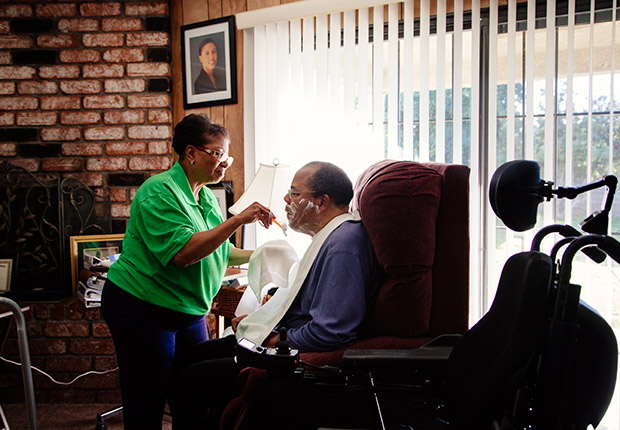AARP Hearing Center

By Laura Mecoy
Cheryl R. Brown already had nearly a lifetime of caregiving experience when her husband was first diagnosed with amyotrophic lateral sclerosis (ALS), also known as Lou Gehrig’s disease, in 2002.
She began caregiving at age 12, when her grandmother suffered a stroke, and continued to help other relatives over the years. Even with all her experience, Brown, 70, said she sometimes struggles to get the equipment and services needed by her husband, Hardy, 71.
“There is no 1-800-CAREGIVER number that you can call and get answers to your questions, unless you’re destitute, and then you might be able to get help from the county,” she said. “But when you are in the middle class, there is nothing available for you, and you don’t know where to go.”
Nearly 6 million Californians face similar challenges every day as the unpaid caregivers for their loved ones. But Brown is different from most caregivers: She’s in a position to help them.
A San Bernardino Democrat who was elected in November to a second term in the State Assembly, Brown wants to create a privately funded task force to make recommendations for improving the state’s caregiver support services.
She won bipartisan support for similar legislation last year, but Gov. Jerry Brown (D) vetoed it, saying no more studies were needed. The assemblywoman disagrees and this year she is crafting a resolution, rather than legislation, because it wouldn’t need the governor’s signature to establish the task force.
“If we could have someone sit down and really put the microscope on this issue, we could develop meaningful recommendations for improving caregiving services,” Brown said. “We know what some of the issues and answers are, but we need those people in the trenches to say, ‘This is the solution.’ ”
AARP California is supporting Brown’s resolution and urging its members to ask their state legislators to do the same.
Growing need, funding cuts
“We have a private-public partnership to establish the task force,” said Blanca E. Castro-Paszinski, advocacy manager for AARP California. “The USC [Davis] School of Gerontology is willing to convene the task force and staff it, and we have very dedicated and willing participants ready to resolve this problem.”
Improving caregiver support services is a growing need because boomers are aging and funding has been cut for these services, Castro-Paszinski said.
Since 2007, the State Assembly has eliminated about $10 million from caregiving support agency budgets, leaving them with just $17.6 million for this fiscal year.
Erin Levi, a gerontologist and advocate for the Association of California Caregiver Resource Centers, said the centers have had to lay off staff and eliminate assistance to rural caregivers because of the funding losses.
“If these unpaid caregivers were to stop providing care, we would not have enough facilities to help the people they are caring for and the cost to the taxpayer would be off the charts,” Brown said.
Brown is determined to keep her husband in their home. He still writes for the weekly newspaper he founded, the Black Voice News, but ALS is a neurodegenerative disease that robs people of the ability to control their muscles. Hardy needs a specialized wheelchair as well as help with daily activities.
When the Assembly is in session, Brown flies between the capital and her home in San Bernardino to care for Hardy on the weekends. During the week, Hardy’s brother takes on the caregiving duties.
Brown has found a way to make her job and caregiving role work. But as it does with so many others, she said, the support system can easily unravel if either the caregiver falls ill or needs to be somewhere else.
“We only have one person to help,” she said. “If he goes down and I go down for some reason, we are in trouble.”
For more information about caregiving, visit the AARP Caregiving Resource Center at aarp.org/caregiving.
Laura Mecoy is a writer based in Manhattan Beach, Calif.































































